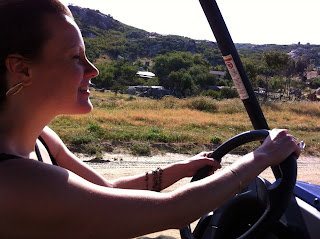The following is a piece I wrote for another purpose, so it may read just a bit more formally than my usual shtick. It does fit the theme of the blog, so please have a go! :-)
______________________________________________________________________________
I’ve been doing yoga since I was 16. I’ve done therapy, studied
meditation, and worked with other anxiety-reducing techniques. Though the
benefits are many, there’s one demon I am not even close to conquering: I'm a
control freak.
“To relinquish the futile effort to control change is one of
the strengthening forces of true detachment and thus true love,” meditation
teacher Sharon Salzberg writes. “Relinquish
the futile effort to control change”-- That's beautiful stuff. What a lofty
goal to work toward. I'm going to get on that one--right after I take an hour
nap, followed by a 45-minute swim, a dinner during which I have one glass of
wine, a cheeseburger with onion rings, and then a few pages in Peter
Mathiesen's The Snow Leopard before
turning the lights out by midnight.
The tight schedule above is a bit of an exaggeration, but in
all honesty, the desire to control is a driving force in my life. Bikram yoga,
with its rigidly outlined series of postures, feeds into my control freakiness.
I like the consistency: 26 postures, two breathing exercises, taught with
virtually the same dialog. I'm also enough of a control freak that I don't mind
it when my boyfriend plans to cook our pizza and I end up doing most of the
work. I like doing it my way!
I could do a cognitive reframe on this, I suppose. Perhaps
I'm simply organizationally inclined.
But that label wouldn't take into account my most recent, desperate attempt to
control the universe.
About a month ago, my boyfriend and I decided he would move
in. Everything had been going swimmingly between us, but the week before the
move, the impact of the change on the horizon hit me. I had lived alone for
almost four years. Before that, I lived with my father in a giant house, and we
orbited each other, interacting only infrequently. It became apparent how
wedded I was to my personal space. Although I loved my boyfriend and knew the
move was the right one, I was anxious.
The boyfriend and I had decided that Saturday was to be the
big day. The boyfriend, completely at ease with the whole move thing, dropped
his stuff at the house in dribs and drabs. (To be fair, he didn’t have much
stuff. Like, at all.) With each load and trip to IKEA, my anxiety mounted.
Instead of being able to address my anxiety head-on, encompassing the complex (and
understandable) emotions that come with such a life change, I funneled it
obsessively into one tiny avenue: the bed.
Now, to say I'm a light sleeper would be an understatement.
I've wrestled with sleep issues since I was old enough to remember. Going to
bed is like going to war: I equip myself with ear plugs, and eye mask, a queen
bed, and a bedtime routine that would have a normal sleeper in a coma 20
minutes in. And now, a man was going to enter this precious space? I was
terrified.
I made the bed my focus in the week leading up to the big
day. What would I do if I couldn't fall asleep? Would I toss and turn, risking
waking him up? Would I relegate myself to the guest bedroom to ensure we both
got a good night's sleep? After a yoga class that week, I stopped at a
consignment store nearby and thought I'd found the answer to my prayers:
 |
| Ugly chaise |
This sofa (a chaise,
if you want to get technical) is ugly as sin. I figured, well, I could put it
in the bedroom, have it set up, and then if I couldn't sleep in the bed I would
be just across the room. Everything with this move in would now be OK! And all
for only $110! And all I'd have to do to get the thing to my house is borrow a
friend's truck, get my boyfriend to take a couple of hours off work, and find
some way to get the thing down into the bedroom.
The boyfriend, bless his heart, was very supportive about
the whole thing, and arranged to take the time off work. Upon glancing at the
couch, however, he said, “OK. Fine, but you're not sleeping on that until you
get it cleaned. It's filthy." He was right. It was filthy, ugly, and would
be a pain to get into the house. But still I pressed forward, on an exhausting
journey involved our carrying the chaise around the entire building, as well as
a $65 cleaning bill.
At every step, my yoga and meditation honed insight told me
to relax, that this couch thing was completely unnecessary. I knew I was taking
a leap into the unknown, and this was scary. At the same time, though, I was
fueled to move forward with the move because it felt like the right thing. This
is love, isn't it? Why can't I relax into this? Why must I try to control this
change?
It’s now been a month since the couch was moved into my
house. It sits, ugly as ever, covered by a sheet, dominated by my three cats.
I’ve yet to sleep on it.
We take many steps in our journey toward mental well-being. At
times, we manage face our doubts head-on and are able to prevent our anxieties
from getting the best of us. At others, they do get the best of us, however,
and giant, lumpy reminders stay with us, reminding us to that we need to keep
working to abandon those “futile efforts to control change.”












